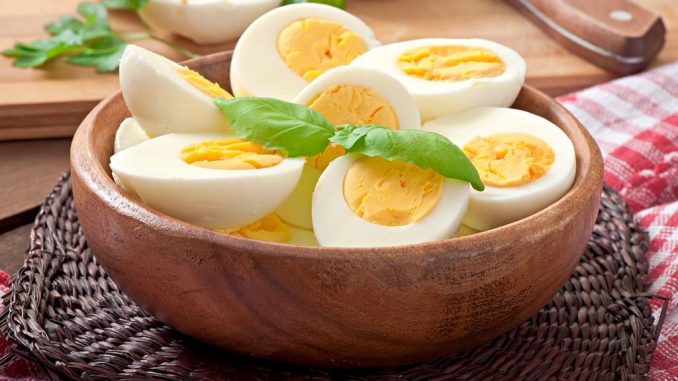
Best Source of Protein
TRUE. Eggs are one of the healthiest foods on earth. It contains about 13 vitamins and minerals. Eggs are actually a body builder’s best friend. It not only contains protein but also contains thiamine and zinc which are nutrients that help in breaking protein down for the body to absorb better. There is no other well-balanced food in the natural world as eggs are.
But there is a danger in eating too many eggs, especially if you consume the parts of the egg separately. Eating egg whites only, which is where protein is mostly stored, will make your body have a difficult time in digesting large amounts of protein. Minerals that aid in the digestion of protein are found in the egg yolk. And eating too much of the egg yolks only will become a factor in increasing your blood pressure. Sulphur is highly concentrated in the egg yolk and the body needs a certain amount of potassium to break it into molecules that the body can easily absorb and potassium is mostly found in the egg white. In order to make most of the vitamins and minerals you can get from eggs, it is best to consume the entire egg.
High Blood Pressure Risk
FALSE. Eggs were labeled to be food that contains plenty of cholesterol. It’s true that eggs have a considerable amount of cholesterol but it is the healthier kind of cholesterol that we’re talking about. A large egg has as much cholesterol as the dash of melted butter used to cook your morning scrambled egg in.
Eggs barely contain cholesterol and trans-fat. In fact, it contains more nutrients that would help your body lower
your high blood pressure. Eating too much egg YOLKS can aid in raising your blood pressure but not enough to make you sick. But eating eggs as a whole is completely healthy. Egg whites and egg yolks supplement each other. High protein content is found in egg yolks but thiamine (Vitamin B6) and zinc are more concentrated on the whites. Thiamine and zinc helps your stomach in producing an enzyme called pepsin. Pepsin is responsible for breaking down protein found in your body.
Best Hangover Cure
FALSE. Although it’s true that packing up on protein and healthy food before going out on a party night will help reduce the chances of your getting a hangover, it doesn’t necessarily apply that raw eggs will cure your hangover.
You might actually be putting yourself in danger of food poisoning by consuming raw eggs in the morning. Eggs contaminated with Salmonella might end up kicking the bucket sooner than you think. As the saying goes, ‘Prevention is cure’ applies well in this scenario. When you’re planning on going out for a buzz at the night club or just chilling out in a bar, pack up on protein and energize yourself. You better add eggs to your meal before consuming alcohol to lower the possibility of you suffering from a horrible hangover.
Dirty egg is organic egg
FALSE. The notion that buying a dirty egg makes the egg organic or the fact that the egg is more natural is a complete myth. An egg left uncleansed – with dirt or chicken poop in it – doesn’t make the egg more natural. In reality, it makes the egg even dirty inside. An eggshell is semi-porous so letting the chicken poop stay on the egg will make the chicken dung enter the egg itself.
Washing an egg and storing it in either the fridge or the pantry will increase the risk of your raw egg being contaminated not only with salmonella but with other bacteria as well. Getting an egg wet makes its shell more porous and it makes it more susceptible for various bacteria to enter the shell and settle in.
HELPFUL TIP: Grab an old clean cloth and spray some vinegar on it to make it mildly wet. Use the slightly damp cloth to wipe the dirt off the eggshells. Vinegar is acidic and it serves as a disinfectant to remove the bacteria that are attached to the eggshell. You may opt to wash the egg before cooking it. If you are going to boil some eggs, makes sure you wash them well before boiling them.
All eggs are fine and healthy
FALSE. With the advent of modern technology, anything natural under the sun can be reproduced. Now there are what we call fake eggs or synthetic eggs. These eggs are literally products of laboratories. They look exactly like the natural egg inside-out. Here are ways to identify a synthetic egg.
- A fake egg’s shell is relatively shinier than a real egg. This isn’t an exact way of identifying a fake egg from a real egg since some real eggs have shiny eggshells.
- Though it looks shiny, the actual feel of a fake egg is quite rough. Imagine a ‘textile’ tile; it looks shiny but feels rough.
- When you shake a fake egg, it makes a splashing sound within. Unlike a real egg, a fake one doesn’t have a film that holds the egg together. It’s simply a liquid inside a shell.
- Whisking egg in a bowl will make the egg look milky; but when whisking a fake egg, the color of the egg is bright yellow.
- When opening an egg, a real egg has a certain meaty smell. Even the smell sticks to your skin after touching a real egg.
- When cracking an egg to a bowl, the egg yolk and egg white immediately mix. They are made of the same chemicals – just different colors – and the egg feel more watery than the real one.
- When making a sunny side up with a fake egg, the yolk spread evenly with the egg white. A fake egg bubbles like boiling water. Stinky egg is bad egg relatively true. A stinky egg only applies to the freshness of an egg. You can only tell if an egg is rotten by the smell. Smell isn’t the only indicator to tell if your egg went bad or not.
There are different ways to identify if an egg is fresh, older or just plain bad. Here are three ways to do it:
Water Test
Drop an egg in a bowl of water and watch. If your egg sinks and lays flat at the bottom of the bowl then your egg is less than a week old. If your egg stands at the bottom of the bowl then the egg is about a week or two. If the egg floats then your egg is still edible but is already more than two weeks old.
As the egg gets older, the air pocket inside the egg gets bigger. This air pocket makes the egg lighter and makes the egg float.
Shake Test
You can’t really drop an egg into a bowl of water when you’re in the supermarket. The simplest and easiest way for you to find out is an egg is fresh is by shaking the egg. If it makes no sound then the egg is edible. Unlike dropping it into a bowl of water, you can’t tell if the egg is fresh or a bit older. If the egg makes a sloshing sound then don’t even think that it can be eaten.
An older egg has a bigger air pocket but it still keeps the egg intact. When the egg goes bad, the air pocket breaks making the egg slosh inside the shell. If you end up getting a noisy egg, then throw it out immediately.
Thickness Test
Crack an egg into a bowl or a plate. Check if the egg white is thick or runny. If the egg white is runny and is thin like water then the egg has definitely gone bad or it is about to.
The Rawer the better
FALSE. Although a raw egg has its highlights in nutrition and has multiple health benefits, raw eggs aren’t as safe as you might think it may be. Raw eggs are breeding grounds for salmonella. The only way to kill salmonella is by cooking the egg.
It is believed that when a person is sick, egg served raw is best for them. FALSE. A sick person might end up being in a worse state of health after consuming a raw egg. Half cooking an egg is far better than not cooking the egg at all. The best way to fry an egg is by frying it until the yolk thickens.
On the other hand, cooking an egg too much doesn’t pose as much threat either. Only that some of the nutrients found in the egg will be lost. When an egg is cooked too much, Hydrogen sulphide – a deadly gas – is formed. Hydrogen sulphide makes its way into the egg yolk but it doesn’t end there. Because the egg yolk is rich in iron, the iron serves as a shield. It chemically reacts with the hydrogen sulphide turning it into nothing less than a greenish part of the egg yolk.
Eggs are highly nutritious and having them in your daily diet will give you more than you ask for in healthy eating.
